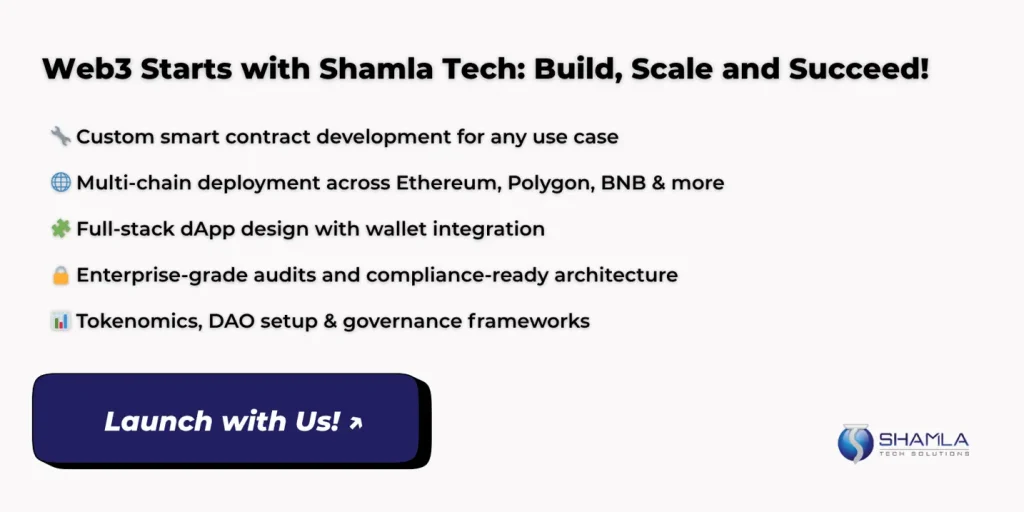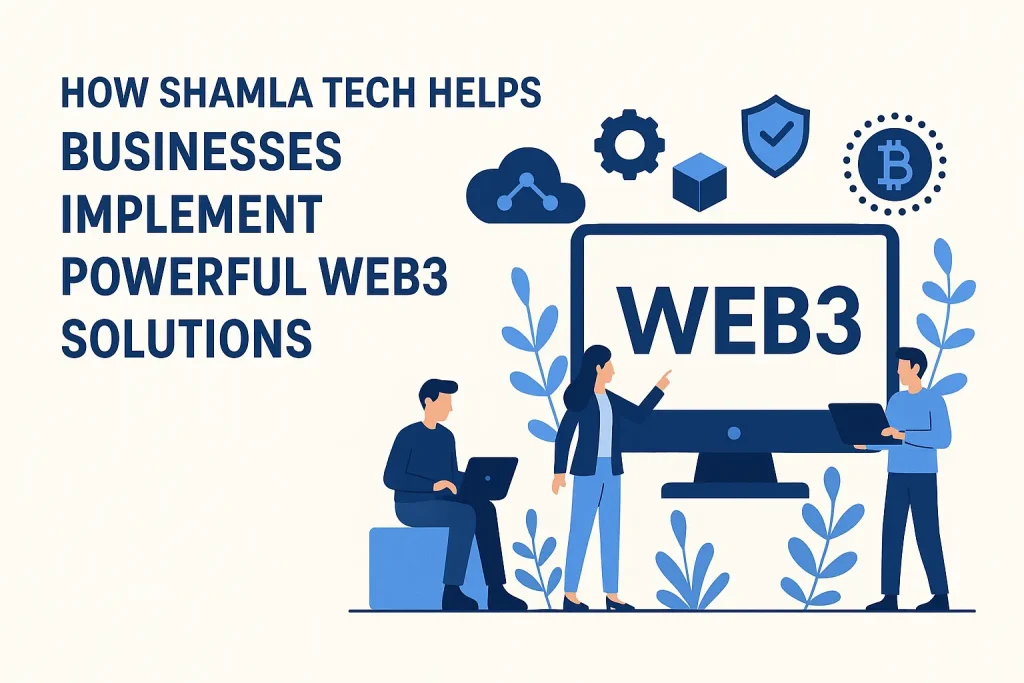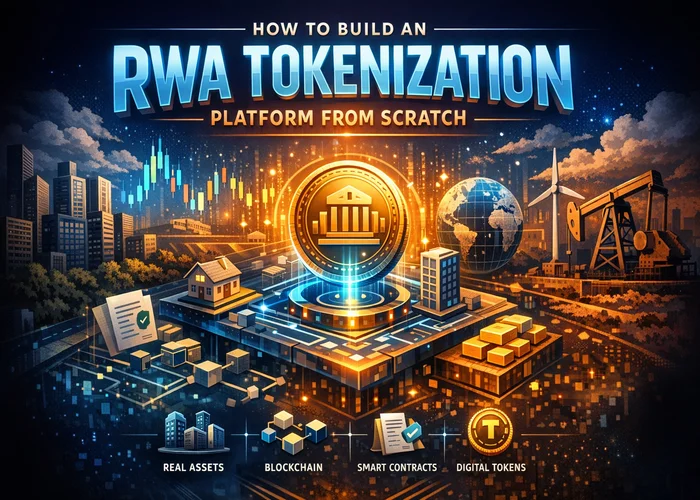Web3 describes a shift from centralized systems to networks where users control data and value directly. Decentralized ledgers let applications run without a single owner, changing how industries work. Web3 development services build tools and platforms that let businesses tap into these networks. By using Web3 solutions, companies can offer secure, transparent, and trust-based products.
Whether handling data or money, Web3 development services help firms remove middlemen, give users control, and open new ways to interact. This new model makes systems more reliable and reduces points of failure. With clear code and open protocols, Web3 solutions create a strong base for future products.
5 Real-World Web3 Use Cases
1. Web3 in Finance: Decentralized Finance (DeFi)
Decentralized Finance uses open ledgers to replace banks and brokers, letting users send, lend, or borrow funds without an intermediary. Web3 applications like decentralized exchanges (DEXs) run on smart contracts, so trades execute automatically when conditions match. Lending platforms let users lock tokens as collateral and borrow assets at rates set by algorithms. Yield farming rewards users who provide liquidity to pools, paying them fees or tokens for each trade.
Without a central server, these platforms run on distributed nodes, making them harder to shut down or tamper with. To build a DeFi platform, teams use Web3 development services that write secure smart contracts, set up nodes, and design user interfaces that connect wallets. Experts audit code to spot flaws in contract logic, reducing the chance of fund loss. They also scale backends to handle spikes in transactions, ensuring trades happen quickly.
By using proven libraries and on-chain data feeds, businesses can offer accurate pricing and safe operations. Web3 development services work with projects to manage security keys, set up decentralized governance, and integrate cross-chain bridges. This way, DeFi platforms remain open, transparent, and resistant to attacks while serving a growing number of users.
2. Web3 in Healthcare: Patient-Centric Data Management
Healthcare data often sits in isolated systems controlled by hospitals or labs. Web3 solutions change this by giving patients ownership of their records through encrypted wallets or identity layers. When a patient visits a new provider, they share a permissioned token that grants access to specific records. NFT-based medical files store a patient’s history on a chain, where only approved addresses can read or write. This prevents unauthorized parties from copying or changing records without consent. Decentralized Autonomous Organizations (DAOs) let researchers pool anonymized data for studies; patients vote on which projects receive access.
By removing central servers, Web3 use cases reduce single points of failure; encrypted data on many nodes stays intact even if one server goes down. To build these systems, teams use Web3 development services to set up private or permissioned chains, design secure identity layers, and integrate existing hospital software. They write smart contracts that enforce data-sharing rules, track who viewed or updated a record, and allow patients to revoke access at any time.
Web3 solutions also let users grant temporary access to doctors or insurers through time-limited tokens. This model cuts paperwork, speeds up approvals, and cuts overbilling. By using clear standards and open code, healthcare providers work with Web3 use cases to make data portable across clinics and labs. The result is smoother care, fewer errors, and faster research without exposing private details.
3. Web3 in Supply Chain: Transparent Logistics & Tracking
Traditional supply chains rely on siloed databases and paper trails that can hide errors or fraud. Web3 applications use a shared ledger where each step – manufacturing, shipping, warehousing, delivery – is logged on-chain. When a product moves from factory to truck, a node writes a new record showing time, location, and handler. Anyone with permission can trace an item’s full history, confirming its origin and handling.
For example, IBM built a blockchain network that tracks food from farm to store. VeChain links RFID tags on goods to on-chain records, so sellers and buyers check authenticity. By storing hashes of documents on a chain, businesses prove records remain unchanged. To build these systems, experts use Web3 solutions that create smart contracts to automate verification at each touchpoint. When a shipment arrives, a contract checks sensor data—like temperature or humidity, before releasing payment. If conditions fall outside set ranges, a flag goes off and triggers alerts.
Web3 applications also use decentralized oracles to pull real-world data securely, so contracts update in real time. Web3 solutions let partners join networks without handing over full control; each uses its own private keys and sees only relevant data. This setup cuts disputes over missing or fake items because all steps record with timestamps that any node can verify. Companies use Web3 solutions to audit processes, speed recalls, and reduce waste. By sharing a common code base and open data protocols, supply chains run with clear records, fewer delays, and lower fraud risk.
4. Web3 in Entertainment: Creator & NFT Economy
The creator economy needs ways for artists to earn directly from fans without platforms taking huge cuts. Web3 use cases introduce NFTs, unique tokens that link to digital art, music, or video—and smart contracts that pay artists whenever a token resells. For example, a musician mints an NFT for a new track; when a fan buys it, the smart contract sends a share of proceeds back to the artist every time the NFT is sold again. Metaverse concerts run entirely on-chain: artists perform in virtual spaces where attendees buy tickets as tokens. Each ticket grants access and can grant extra perks like backstage passes or voting rights on setlists.
Tokenized fan engagement means creators mint tokens that let holders join exclusive chats, vote on project directions, or earn a share of revenue. This model cuts out labels or distributors, so artists keep more revenue. To deploy these ideas, teams use Web3 development services to design and test smart contracts, set up minting interfaces, and integrate wallets on websites or apps. Developers handle metadata storage so art files live on IPFS or similar networks, ensuring permanence and censorship resistance.
They also build marketplaces where minting, buying, and reselling happen smoothly, with clear on-chain fee splits. Web3 use cases in entertainment rely on audit firms and monitoring tools to stop scams or copy-token attacks. Web3 development services guide creators through token standards, ERC-721 or ERC-1155, so they pick the right fit. By offering clear docs and code samples, these services let artists focus on their work while the platform handles token flows, royalties, and event logistics.
5. Web3 in Real Estate: Tokenized Assets & Smart Contracts
Real estate transactions often involve lawyers, banks, and brokers, which slow transfers and add fees. Web3 applications let owners break property into tokens that represent shares, anyone can buy a fraction through a secure portal. These tokens live on a chain, so transfers happen instantly when a buyer pays in cryptocurrency or stablecoins. Smart contracts enforce rules: when a token moves, the contract records fees, updates ownership, and triggers a legal check automatically.
Blockchain-based land registries store property rights as on-chain entries, making it easy to check titles and history. Rental agreements become self-executing; tenants pay rent in tokens, and the contract releases keys or access codes only when payment clears. If rent is late beyond a set date, the smart contract sends alerts or applies penalties. To build these tools, teams use Web3 solutions that map off-chain records, like local deeds or tax records – onto on-chain data structures. They write contracts that handle escrow, title transfers, and payouts to all parties. Web3 applications rely on decentralized oracles to verify real-world events, such as building inspections or insurance payouts, before contract steps progress.
Using these solutions cuts closing times from weeks to hours, reduces mistakes in paperwork, and lowers costs by trimming middlemen. Expert Web3 development services ensure contracts follow regional laws and meet compliance checks. They also set up permissioned networks so only approved entities, banks, legal offices, registries, can validate transactions, while the general public still sees summary data. With clear code and open logs, property sales become faster, more transparent, and more accessible to small investors worldwide.
How Shamla Tech Helps Businesses Implement Powerful Web3 Solutions
Shamla Tech is a Web3 development company that guides clients from concept to launch. We build systems that use distributed ledgers, smart contracts, and secure identity layers. Our process begins with clear planning: we map business goals to specific Web3 use cases and sketch a technical path.
For a finance startup, we design token flows, set up nodes on Ethereum or Polygon, and write smart contracts that follow best practices. For a healthcare provider, we create a private ledger that stores encrypted medical files and write permission rules that let only doctors or patients access data. For a supply chain firm, we set up oracles to feed real-world sensor data into smart contracts, so payments or alerts trigger automatically.
In each project, we use audit tools to scan contract code for vulnerabilities, run load tests to ensure networks handle peak traffic, and integrate wallets so users can interact smoothly.
Our Web3 development services include:
- Smart Contract Engineering: We write, test, and deploy contracts in Solidity or Rust. Each contract follows secure patterns to avoid reentrancy or overflow bugs. We use open-source libraries like OpenZeppelin to reduce risk.
- Node Deployment & Maintenance: We set up full nodes on target chains, configure validators or RPC endpoints, and monitor uptime. We also manage private or permissioned networks where needed.
- Front-End Integration: We build user interfaces that connect to MetaMask, WalletConnect, or custom wallets. By using libraries like web3.js or ethers.js, our code handles signature requests, token approvals, and event listeners in a simple way.
- Security Audits & Compliance: We conduct internal reviews and partner with third-party firms to audit contracts. We also help clients meet regional rules by adding on-chain KYC modules or identity checks.
- Tokenomics & Governance: For projects that need tokens, we design models that reward users and align incentives. We set up on-chain voting modules or DAOs to let communities propose and approve changes.
- Maintenance & Upgrades: After launch, we offer 24/7 support to monitor nodes, update contracts, and patch vulnerabilities. We also guide clients through chain upgrades or migrations when networks change.
Across finance, healthcare, logistics, media, and real estate, Shamla Tech customizes Web3 applications to real needs. Our agile approach means we deliver functional prototypes in weeks, test them in live environments, and refine them based on feedback. By focusing on clear code, open standards, and simple interfaces, we help businesses adopt Web3 solutions that scale. Whether adding NFTs to a marketing campaign or building a land registry, our Web3 development services turn complex ideas into usable products. We support clients around the world, ensuring each project meets local rules, operates securely, and drives real value through transparent, trustless systems.
Conclusion
Choosing the right partner makes all the difference when launching Web3 applications.
Shamla Tech’s Web3 development services build clear, secure platforms that let you focus on core business goals. By handling smart contracts, node setups, and front-end integration, we help you bring ideas to life without guessing.
With proven methods and open processes, our team delivers Web3 solutions that stand up to audits, scale to thousands of users, and adapt as technology evolves. Let us turn your next Web3 use case into a live product that users trust.
Contact us today to build your own Web3 Application!











